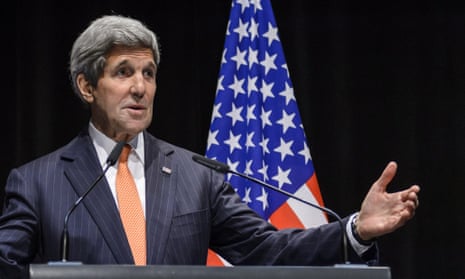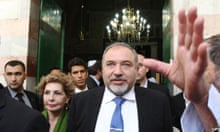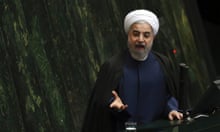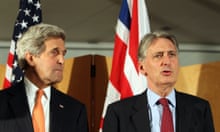International negotiations on Iran’s nuclear programme have made dramatic strides towards a comprehensive agreement, according to diplomats at the marathon talks, now entering a critical last week before a major deadline.
The negotiators are due to gather once more in Lausanne on Wednesday, for a session that is due to last until Sunday, but could spill over until the following Tuesday, the deadline for producing a framework accord that lays out the main points of agreement. They would then have three more months to fill in the details for a comprehensive deal at the end of June.
The lead western negotiator, US secretary of state John Kerry, met his counterparts from the UK, France, Germany and the EU at London’s Heathrow airport on Saturday and declared that “substantial progress had been made in key areas although there are still important issues on which no agreement has yet been possible”.
Diplomats at Lausanne confirmed that provisional agreement had been reached on a central issue that had defied compromise for years, Iran’s enrichment capacity. The mantra at the negotiations is that “nothing is agreed until everything is agreed” but the figures pencilled in so far would allow Iran to run 6,000 of its current centrifuges for the lifetime of the deal, which would be ten to fifteen years. That would be a dramatic reduction compared to the current infrastructure of 10,000 operating centrifuges, and another 9,000 installed but non-operational. The Iranian stockpile of low enriched uranium would also be radically reduced from thousands of kilograms to hundreds.
The heavy-water reactor under construction at Arak would also be reconfigured so that it would be produce much less plutonium (the other possible path to a bomb).
The areas where no agreement has not been reached so far are the extent of research and development Iran would be allowed over the life of a deal, particularly development work on new model centrifuges, and the lifting of UN sanctions.
The easier of the two problems is likely to be R&D. It has been handed to the US energy secretary, Ernest Moniz, and the head of the Iranian atomic energy organisation, Ali Akbar Salehi, to solve. They are both physicists who studied at the Massachusetts Institute of Technology in the same period and are said to have established a good working relationship. They are generally expected to reach a compromise.
Sanctions is by far the hardest problem. In return for the limits it accepts on its nuclear programme, Iran will be freed of the EU oil embargo and other European restrictions, including exclusion from the SWIFT electronic banking system. US sanctions would be suspended by presidential waiver in the months after a final deal. European diplomats in Lausanne estimated that those measures alone would help lift Iran to seven or eight per cent growth.
However, Iran is determined that UN sanctions should also be lifted, because the security council resolutions underlying them categorise the nuclear programme as illegal and a threat to international peace and security. From Tehran’s point of view they were illegally imposed, and serve to justify all other bilateral and regional sanctions.
On the table in Lausanne, Iran was being offered a step-by-step lifting of UN sanctions, in return for “irreversible” steps it takes in dismantling nuclear infrastructure. At present, Tehran is rejecting that offer. On Saturday, the supreme leader, Ali Khamenei, demanded that sanctions should be lifted “immediately” and vowed that Iran would not submit to “bullying”.
The offer is also under fire from within the six nation negotiating group in talks with Iran. France signalled strenuously during the last two days of negotiations in Lausanne that it did not believe the bulk of negotiations should be removed until the International Atomic Energy Agency (IAEA) certifies that Iran has resolved all its questions about evidence of past development work on nuclear warhead design.
At one point, the French foreign minister, Laurent Fabius, telephoned his delegation at Lausanne to insist they did not give ground on the issue.
If France sticks to that position, a framework deal could be much harder to achieve. In Iran’s eyes, it is being asked by the IAEA to prove a negative, and disprove evidence it says is fabricated. It could be in limbo indefinitely. Iran analysts say that if weaponisation work did take place Tehran would not admit it for fear of justifying the calls of hawks in Israel and the US for military action. An admission would also imply that the supreme leader had lied over the existence of a weapons programme.
Saturday’s meeting in Heathrow was intended to harmonise positions among the western negotiators and the foreign ministers emerged declaring “unity of purpose”. European diplomats in Lausanne pointed out that Fabius had staged a similar dramatic intervention before the completion of an interim agreement in November 2013, but France had ultimately supported that deal. They predicted that the same would happen this time around, once Paris had signalled to its allies in Israel and the Gulf that it had battled for a strong agreement.
Senior Israeli officials went to Paris on Sunday to seek to maintain French resolve when the negotiators reconvene on Wednesday. Meanwhile, the threat of US Congressional action on sanctions torpedoing the talks has been put off by the Senate until mid-April. But even if a framework deal is agreed in Lausanne in the coming week, Congress will be the most potent threat to its survival until a final deal can be signed at the end of June.







Comments (…)
Sign in or create your Guardian account to join the discussion